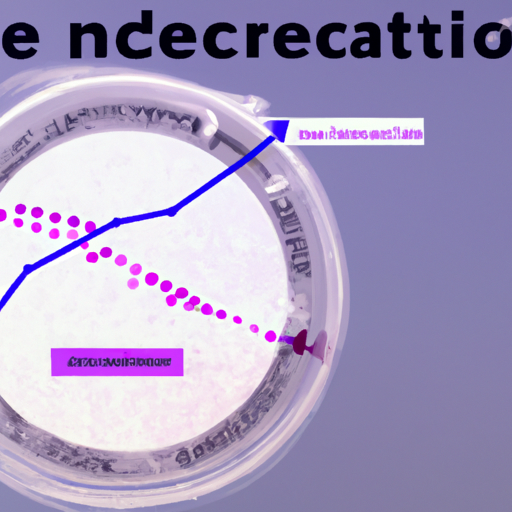How AI Can Help Monitor Blood Glucose Levels in Type 1 Diabetes Patients
Living with type 1 diabetes can be a challenge, but with the help of artificial intelligence (AI), monitoring blood glucose levels can be made easier. AI can help to provide more accurate and timely readings of blood glucose levels, allowing for better management of the condition.
AI can be used to monitor blood glucose levels in a variety of ways. For example, AI-enabled devices can be used to measure glucose levels in the blood. These devices use sensors to detect glucose levels and then send the data to a smartphone or other device. This data can then be used to track trends in blood glucose levels over time.
AI can also be used to provide personalized advice and recommendations for managing blood glucose levels. For example, AI-enabled systems can analyze data from glucose monitors and provide personalized advice on diet, exercise, and medication. This can help to ensure that blood glucose levels remain within a healthy range.
AI can also be used to detect patterns in blood glucose levels that may indicate a potential problem. For example, AI-enabled systems can detect patterns in blood glucose levels that may indicate a risk of hypoglycemia or hyperglycemia. This can help to alert patients and their healthcare providers to potential problems before they become serious.
Overall, AI can be a powerful tool for helping to manage type 1 diabetes. By providing more accurate and timely readings of blood glucose levels, AI can help to ensure that patients remain healthy and that their condition is properly managed.
Exploring the Benefits of AI-Powered Insulin Delivery Systems for Type 1 Diabetes Patients
As a person living with type 1 diabetes, you know that managing your condition can be a challenge. You have to constantly monitor your blood sugar levels and adjust your insulin dosage accordingly. But what if there was a way to make this process easier?
Enter AI-powered insulin delivery systems. These systems use artificial intelligence (AI) to monitor your blood sugar levels and automatically adjust your insulin dosage as needed. This means that you don’t have to constantly monitor your blood sugar levels and adjust your insulin dosage manually.
The benefits of AI-powered insulin delivery systems are numerous. For starters, they can help you maintain better control of your blood sugar levels. This can help reduce the risk of complications associated with type 1 diabetes, such as heart disease, stroke, and kidney failure.
In addition, AI-powered insulin delivery systems can help you save time and money. By automatically adjusting your insulin dosage, you don’t have to spend time and money on manual adjustments. This can help you save money on doctor’s visits and other medical expenses.
Finally, AI-powered insulin delivery systems can help you feel more in control of your diabetes. By taking the guesswork out of managing your condition, you can feel more confident in your ability to manage your diabetes.
Overall, AI-powered insulin delivery systems offer numerous benefits for type 1 diabetes patients. They can help you maintain better control of your blood sugar levels, save time and money, and feel more in control of your condition. If you’re living with type 1 diabetes, an AI-powered insulin delivery system may be worth considering.
Examining the Potential of AI-Powered Diabetes Management Apps

Are you living with diabetes? If so, you know how important it is to manage your condition. Fortunately, there are now a variety of AI-powered diabetes management apps that can help you stay on top of your health.
These apps use artificial intelligence (AI) to help you better understand and manage your diabetes. They can track your blood sugar levels, provide personalized advice, and even alert you when your levels are too high or too low.
The first step in using an AI-powered diabetes management app is to enter your data. This includes your age, gender, weight, and other health information. The app will then use this data to create a personalized plan for managing your diabetes.
The app can also track your blood sugar levels over time. This allows you to see how your diet and lifestyle choices are affecting your health. You can also use the app to set reminders for taking your medication or checking your blood sugar levels.
The app can also provide personalized advice based on your data. For example, if your blood sugar levels are too high, the app may suggest that you reduce your carbohydrate intake or increase your physical activity.
Finally, the app can alert you when your blood sugar levels are too high or too low. This can help you take action quickly to avoid serious health complications.
Overall, AI-powered diabetes management apps can be a great tool for managing your diabetes. They can help you better understand your condition and make informed decisions about your health. So, if you’re living with diabetes, consider giving one of these apps a try!
How AI Can Help Improve Diet and Exercise Habits for Type 1 Diabetes Patients
Living with type 1 diabetes can be a challenge, but with the help of artificial intelligence (AI), it doesn’t have to be. AI can help improve diet and exercise habits for type 1 diabetes patients, making it easier to manage the condition and stay healthy.
AI can help type 1 diabetes patients by providing personalized nutrition and exercise advice. AI-powered apps can track a patient’s diet and exercise habits, and then provide tailored advice on how to make healthier choices. For example, an AI-powered app might suggest healthier food options or suggest a more effective exercise routine. AI can also help patients track their blood sugar levels and provide reminders to take medication.
AI can also help type 1 diabetes patients by providing access to virtual health coaches. Virtual health coaches can provide personalized advice and support to help patients stay on track with their diet and exercise goals. They can also provide education about diabetes and help patients understand how to manage their condition.
Finally, AI can help type 1 diabetes patients by providing access to virtual support groups. Virtual support groups can provide a safe and supportive environment for patients to connect with others who are living with type 1 diabetes. This can be a great way for patients to get advice and support from people who understand what they’re going through.
AI can be a powerful tool for type 1 diabetes patients, helping them to manage their condition and stay healthy. With the help of AI, type 1 diabetes patients can get personalized advice and support to help them make healthier choices and stay on track with their diet and exercise goals.
Investigating the Role of AI in Developing New Treatments for Type 1 Diabetes
Type 1 diabetes is a serious and life-threatening condition that affects millions of people around the world. It is caused by the body’s inability to produce enough insulin, a hormone that helps regulate blood sugar levels. As a result, people with type 1 diabetes must take insulin injections or use an insulin pump to manage their condition.
In recent years, artificial intelligence (AI) has been used to develop new treatments for type 1 diabetes. AI is a form of computer technology that can learn from data and make decisions without human intervention. By using AI, researchers can analyze large amounts of data quickly and accurately, allowing them to identify patterns and develop new treatments.
One example of an AI-based treatment for type 1 diabetes is an algorithm that can predict a person’s risk of developing hypoglycemia (low blood sugar). This algorithm uses data from a person’s medical history, lifestyle, and other factors to determine their risk. This information can then be used to adjust the person’s insulin dosage or provide other interventions to reduce their risk of hypoglycemia.
Another example of an AI-based treatment is an algorithm that can predict a person’s risk of developing diabetic ketoacidosis (DKA). DKA is a serious complication of type 1 diabetes that can be life-threatening if not treated quickly. This algorithm uses data from a person’s medical history, lifestyle, and other factors to determine their risk of developing DKA. This information can then be used to adjust the person’s insulin dosage or provide other interventions to reduce their risk of DKA.
AI is also being used to develop new treatments for type 1 diabetes that are more personalized and tailored to an individual’s needs. For example, AI-based algorithms can be used to analyze a person’s medical history, lifestyle, and other factors to determine the best treatment plan for them. This can help ensure that the person is receiving the most effective treatment for their condition.
Overall, AI is playing an important role in developing new treatments for type 1 diabetes. By analyzing large amounts of data quickly and accurately, AI-based algorithms can identify patterns and develop personalized treatments that are tailored to an individual’s needs. This can help ensure that people with type 1 diabetes are receiving the most effective treatment for their condition.
